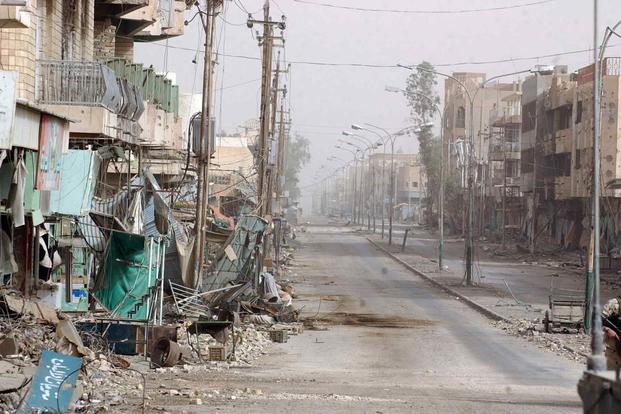The opinions expressed in this op-ed are those of the author and do not necessarily reflect the views of Military.com. If you would like to submit your own commentary, please send your article to opinions@military.com for consideration.
Fallujah, Iraq, was the scene of two major battles in 2004 that have become among the most famous from two decades of the Global War on Terrorism. The city housed about 300,000 residents in 40,000 to 50,000 concrete homes and apartments spread over 10 square miles.
Gaza City is roughly twice that size, with 800,000 residents packed into 17 square miles. They are similar in geography, penury and structure. But for potential military operations, they are strikingly dissimilar. In both Gaza City and Fallujah, most residents fled before the assault. But as I explained in my book, "No True Glory," success in the Fallujah battle depended upon the coordinated advance of experienced small unit infantry -- squads and platoons.
There were two separate fights. In April 2004, four American contractors were murdered in Fallujah. In response, the White House ordered then-Maj. Gen. Jim Mattis to seize the city against his advice. Rather than employ heavy indirect firepower, Mattis chose speed by small infantry units. Fifty squads had advanced halfway across the city in less than a week, supported by precision airstrikes. But the press was fixated on civilian casualties, causing President George W. Bush to flinch. He ordered Mattis to pull his troops out.
In November, the Marines were ordered to retake the city. The attack required much heavier firepower to root out the terrorists who had had six months to prepare. In the April attack, 150 airstrikes destroyed 100 buildings, with artillery scarcely used. In the November attack, 14,000 artillery and mortar shells and 2,500 tank rounds were employed, along with 540 airstrikes; 18,000 buildings were damaged or destroyed. As the residents returned, U.S. engineers restored the water and power systems.
Altogether in the two battles, there were 700 airstrikes in 34 days of combat. Israel has already exceeded that number, and the ground battle has not yet commenced. The Israeli Defense Forces lack the numerous battle-experienced small infantry units the U.S. employed in Fallujah. The ground operation in Gaza will be fought with massive indirect fires, inflicting far heavier material damage.
The same is true in terms of publicity and its policy effect. When the Marine assault in April of 2004 was portrayed by the press as shocking, President Bush ordered the Marines out. Al-Qaida and a range of other insurgent groups then took over the city.
In the Gaza case, horror and repugnance at Hamas have evoked widespread American press support for Israel's forthcoming ground battle. This includes acceptance of widespread destruction and civilian suffering. President Joe Biden has pledged full support, to include weapons and munitions. Whether Israel will permit reporters to embed with its ground forces is not known. Nevertheless, unlike in the April battle in Fallujah, there is no reason to believe that press coverage will dramatically alter the firmness of White House support.
While Fallujah and Gaza are dissimilar in terms of military operations and policy resolve, they are similar in their mutual lack of an end state. After Fallujah was retaken in late 2004, it was not tied to the larger problem that the Iraq war was just sputtering on. There was no movement to immediately quash the al-Qaida stranglehold on Ramadi, a large city only 20 miles away.
Similarly concerning Gaza, there is no movement by U.S. policymakers to acknowledge that Iran is the controlling malevolent force behind Hamas. There's no indication that the administration understands that Iran's enmity is implacable.
-- A former assistant secretary of defense and combat Marine, Bing West is author of "No True Glory: A Firsthand Account of the Battle for Fallujah." He has written a dozen books about America's wars in Vietnam, Iraq and Afghanistan.











